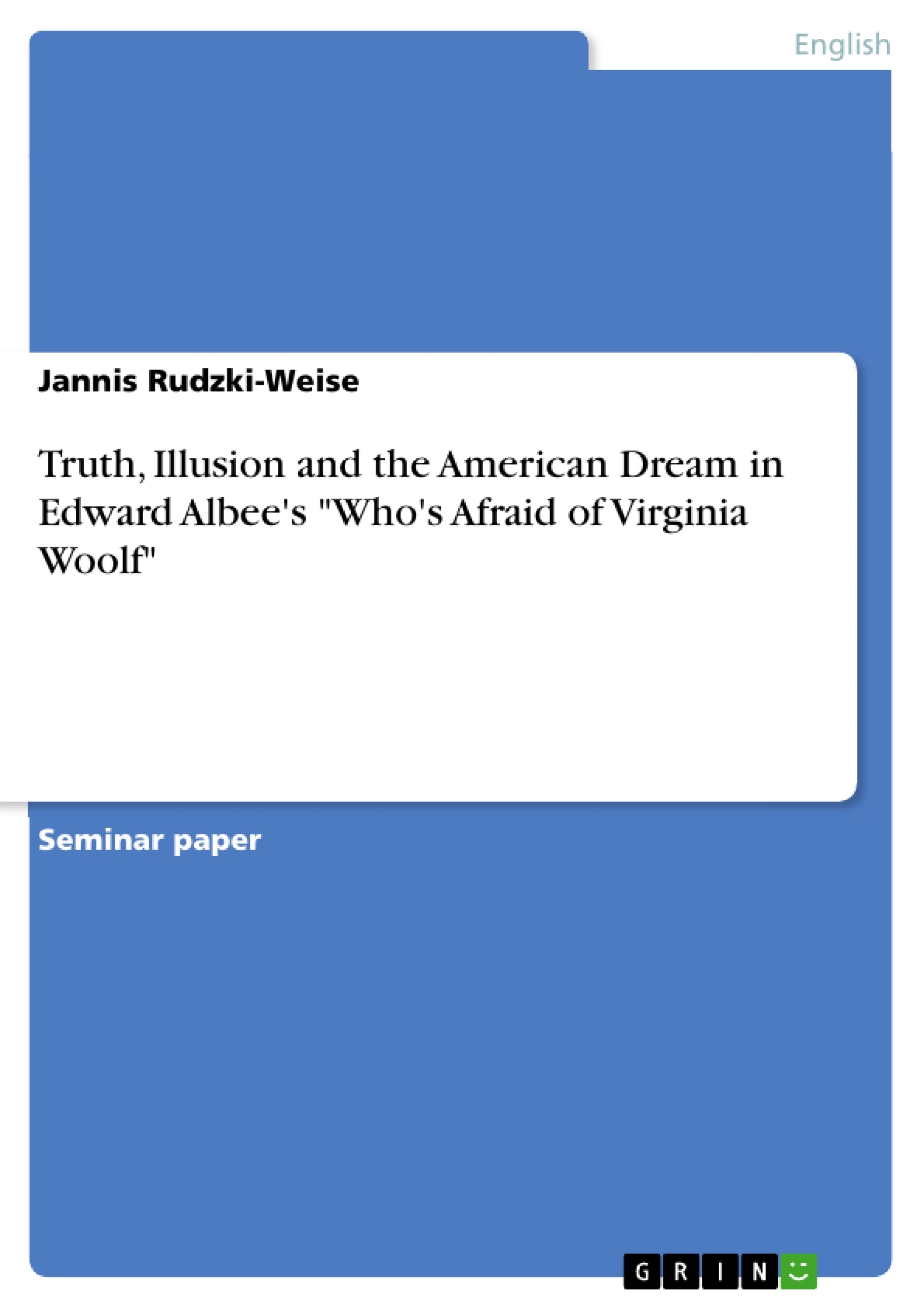Edward Albee’s “Who’s Afraid of Virginia Woolf” has become one of the
major works in American dramatic history (Roundane 42) and a huge career boost for Albee himself. This is not surprising as this masterpiece is considered to be revolutionary and ambitious as well as scandalous and highly controversial at the same time.
The play, which has been discussed so passionately, “gives us four
almost unrelievably nasty people who for something like three-and-a-half hours […] take part in a drunken orgy of backbiting, bitchery, humiliation,verbal castration, exposure and physical mauling” (Hilfer 121).
Not only wanting to entertain the audience but also including social
criticism, Albee makes use of essential themes which help to make people understand their situation and to make them realize the necessity to act in order to modify society.
In the course of this paper, I am going to attempt to illustrate the
importance of the American Dream and to establish a connection to the topic of truth and illusion which can be understood as the basis of Albee’s concept.
To start with, I will exemplify different aspects of the American Dream and point out selected features of the characters that can be linked to the American Dream. In order to appreciate most of the professional criticism, it is of the utmost importance to look at the issue of truth and illusion that is predominant in many parts of the play.
Examining the subject matter of illusion, I will concentrate on the imaginary son as well as the relationship between the guests Nick and Honey.
In a last step, I am going to explain the issue of truth in the play by examining the killing of the imaginary son and the confession of Nick and his wife.
Examining selected scenes, I will try to clarify the aspects Albee criticizes and explain the requests the author has.
For many people the ‘American Dream’ is an ethos that grants everybody the opportunity to achieve “Life, Liberty and the Pursuit of Happiness”(Declaration of Independence). The myths of success and virtue seem to be a goal Americans have been striving to achieve for a long time. Dreams can be fulfilled by anybody, no matter the social background, through hard work and determination.
Writing the play during the Cold War in 1962, when the world was
close to a nuclear war, Albee responded to the questioning of the patriotic beliefs which was an ongoing problem in the USA.
Inhaltsverzeichnis (Table of Contents)
- Introduction
- The American Dream
- Illusion
- The Imaginary Son
- Nick and Honey's Marriage
- Truth
- Killing the Imaginary Son
- Nick and Honey's Confession
- Conclusion
Zielsetzung und Themenschwerpunkte (Objectives and Key Themes)
This paper aims to analyze the portrayal of the American Dream in Edward Albee's "Who's Afraid of Virginia Woolf?", highlighting the interplay of truth and illusion within the play. By examining the characters' actions and interactions, the paper seeks to understand how the play critiques and deconstructs the traditional American Dream narrative.
- The American Dream and its complexities
- The role of truth and illusion in personal relationships
- The impact of societal expectations on individual identity
- The nature of marriage and its challenges
- The interplay of social and psychological factors in human behavior
Zusammenfassung der Kapitel (Chapter Summaries)
- Introduction: The introduction discusses the significance of "Who's Afraid of Virginia Woolf?" in American drama and introduces the play's central themes of the American Dream, truth, and illusion.
- The American Dream: This chapter explores the concept of the American Dream and its portrayal within the play. It examines how the characters embody different aspects of the American Dream, both conforming to and rejecting its ideals.
- Illusion: The chapter examines the theme of illusion, focusing on the concept of the "imaginary son" and the troubled relationship between Nick and Honey. It explores how illusion plays a role in shaping the characters' perceptions of themselves and their relationships.
Schlüsselwörter (Keywords)
The key words and topics of this text are the American Dream, truth, illusion, marriage, social criticism, identity, and the portrayal of characters within a theatrical context. The paper examines the play's critique of societal expectations, its exploration of the complexities of human relationships, and the role of illusion in shaping reality.
Frequently Asked Questions
What is the central theme of Albee's "Who's Afraid of Virginia Woolf"?
The play explores the complex interplay between truth and illusion, specifically how characters use illusions to cope with their failure to achieve the traditional American Dream.
How does the play critique the American Dream?
Albee deconstructs the myths of success, virtue, and domestic happiness. The characters embody the failure of these ideals, showing that hard work and determination do not always lead to the promised "Pursuit of Happiness."
What is the significance of the "imaginary son"?
The imaginary son is the ultimate illusion shared by George and Martha. It serves as a psychological crutch to sustain their marriage and mask their disappointments, until its "killing" forces them to face the truth.
How are Nick and Honey's marriage portrayed?
Their marriage is initially presented as a younger version of the American Dream, but it is quickly revealed to be built on secrets, medical illusions (hysterical pregnancy), and social climbing.
What social criticism does Edward Albee include in the play?
Written during the Cold War, the play critiques patriotic beliefs and societal expectations that force individuals into "nasty" behavior and emotional castration to maintain a facade of respectability.
- Quote paper
- Jannis Rudzki-Weise (Author), 2009, Truth, Illusion and the American Dream in Edward Albee's "Who's Afraid of Virginia Woolf", Munich, GRIN Verlag, https://www.grin.com/document/163016



